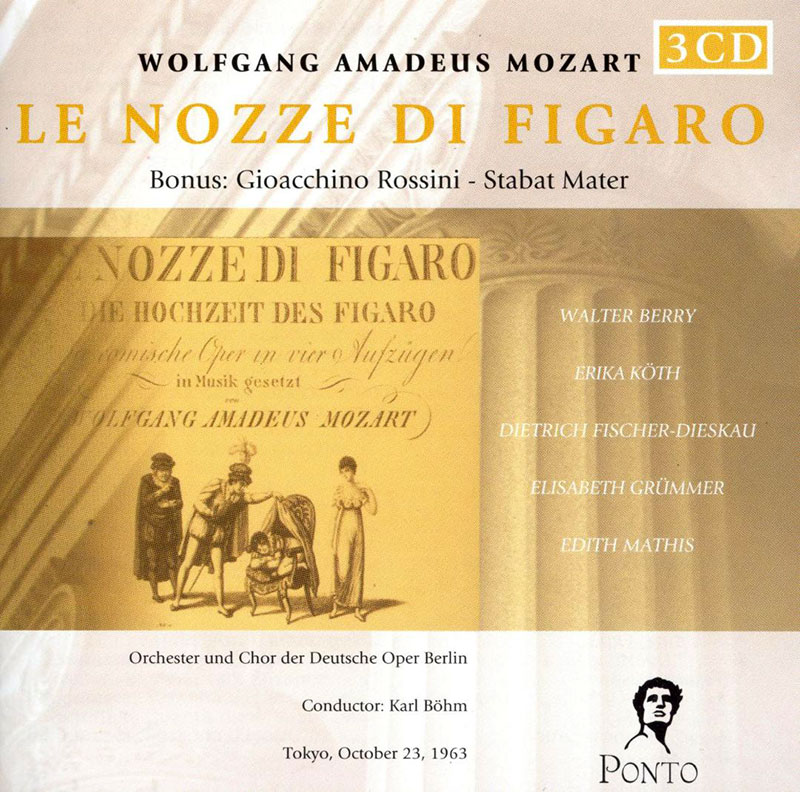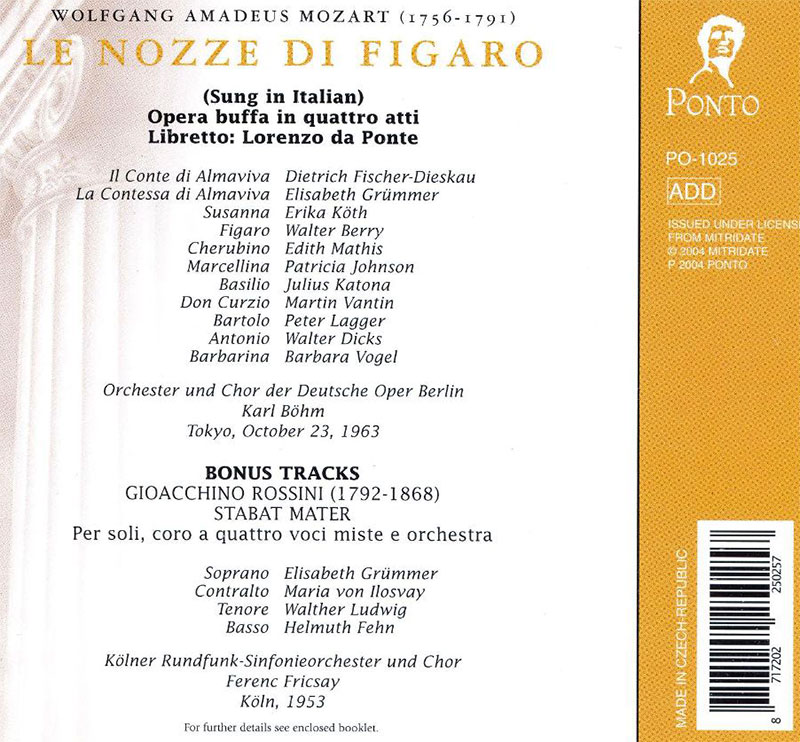Logowanie
Dlaczego wszystkjie inne nie brzmią tak jak te?
Chai Lang, Fan Tao, Broadcasting Chinese Orchestra
Illusive Butterfly
Butterly - motyl - to sekret i tajemnica muzyki chińskiej.
SpeakersCorner - OSTATNIE!!!!
RAVEL, DEBUSSY, Paul Paray, Detroit Symphony Orchestra
Prelude a l'Apres-midi d'un faune / Petite Suite / Valses nobles et sentimentales / Le Tombeau de Couperin
Samozapłon gwarantowany - Himalaje sztuki audiofilskiej
PROKOFIEV, Stanislaw Skrowaczewski, Minneapolis Symphony Orchestra
Romeo and Juliet
Stanisław Skrowaczewski,
✟ 22-02-2017
BARTOK, Antal Dorati, Philharmonia Hungarica
Dance Suite / Two Portraits / Two Excerpts From 'Mikrokosmos'
Samozapłon gwarantowany - Himalaje sztuki audiofilskiej
ENESCU, LISZT, Antal Dorati, The London Symphony Orchestra
Two Roumanian Rhapsodies / Hungarian Rhapsody Nos. 2 & 3
Samozapłon gwarantowany - Himalaje sztuki audiofilskiej
Winylowy niezbędnik
ClearAudio
Cartridge Alignment Gauge - uniwersalny przyrząd do ustawiania geometrii wkładki i ramienia
Jedyny na rynku, tak wszechstronny i właściwy do każdego typu gramofonu!
ClearAudio
Harmo-nicer - nie tylko mata gramofonowa
Najlepsze rozwiązania leżą tuż obok
IDEALNA MATA ANTYPOŚLIZGOWA I ANTYWIBRACYJNA.
Wzorcowe
Carmen Gomes
Celebrating the art and spirit of music - vol. 5 - Reference Songs
- CHCECIE TO WIERZCIE, CHCECIE - NIE WIERZCIE, ALE TO NIE JEST ZŁUDZENIE!!!
Petra Rosa, Eddie C.
Celebrating the art and spirit of music - vol. 3 - Pure
warm sophisticated voice...
SAMPLER - STS DIGITAL, Gregor Hamilton
Celebrating the art and spirit of music - vol. 2 - Love songs from Gregor Hamilton
...jak opanować serca bicie?...
SAMPLER - STS DIGITAL
Celebrating the art and spirit of music - vol. 1 - Leonardo Amuedo
Największy romans sopranu z głębokim basem... wiosennym
Lils Mackintosh
Celebrating the art and spirit of music - vol. 4 - A Tribute to Billie Holiday
Uczennica godna swej Mistrzyni
MOZART, Walter Berry, Erika Koth, Dietrich-Fischer Dieskau, Elisabeth Grummer, Deutsche Oper Berlin, Karl Bohm
Le Nozze di Figaro / Stabat Mater

Le nozze di Figaro – Comic opera in four acts K.492 [165:04] Dietrich Fischer-Dieskau (Count Almaviva), Elisabeth Grümmer (Countess Almaviva), Erika Köth (Susanna), Walter Berry (Figaro), Edith Mathis (Cherubino), Patricia Johnson (Marcellina), Julius Katona (Basilio), Martin Vantin (Don Curzio), Peter Lagger (Bartolo), Walter Dicks (Antonio), Barbara Vogel (Barabarina), Chorus and Orchestra of the Deutsche Oper, Berlin Karl Böhm. Recorded live in Tokyo, October 23rd 1963. Gioacchino ROSSINI (1792-1868) Stabat Mater [54:08] Elisabeth Grümmer (soprano), Maria von Ilosvay (contralto), Walther Ludwig (tenor), Helmuth Fehn (bass), Cologne Radio Chorus and Symphony Orchestra Ferenc Fricsay Recorded live in Cologne, 1953 Recorded in Tokyo on October 23, 1963, this live recording of Nozze di Figaro boasts fine sound, a top cast, and the leadership of a conductor of great skill and experience. The label, Ponto, has joined the ranks of such other companies as Opera D'oro and Gala in making available broadcast and in-house recordings at affordable prices. Sometimes these releases are not even worth the modest price asked for; this one may well have more to offer than higher-priced studio sets. After a slightly hesitant first few moments, the sound quality settles down and becomes admirably strong and well defined. There is relatively little stage noise, the voices have a natural presence without being too forwardly placed, and Böhm's orchestral control can be relished. His may be an old-fashioned reading, but it never lags or lacks for humor or beauty. The audience can be heard laughing from time to time at the stage antics; applause only interferes with the musical pleasures at the end of Non piu andrai, when unrestrained clapping covers a bit of Böhm's ironically happy martial send-off. Tokyo delighted in a first-rank cast. Elisabeth Grümmer's Countess seems to be Ponto's focus; she is also the soprano soloist in the Rossini Stabat Mater, which comes as a bonus on disc three. In her early 50s at the time of the performance, she retains ample vocal beauty while offering a mature edge to her sadness as well. Her unfaithful spouse, the Count, is Dietrich Fischer-Dieskau, who went on to record the role under Böhm for Deutsche Grammophon. In 1963 his voice is in its prime, and there is not much of the over-emphatic delivery sometimes found in his later work. Walter Berry's Figaro under Böhm is also available on DVD in a recently released 1966 Salzburg festival performance. Berry and his Susanna, Erika Köth, have a warm vocal chemistry. Some may find Köth's Susanna a little too chirpy, but that very quality also suggests the type of cheerful, pretty Susanna that would very likely have attracted the Count. Edith Mathis is a very feminine sounding Cherubino; as a matter of fact, she went on to sing Susanna under Böhm for the DG recording. Such a pretty voice may not work for every listener, but purely as singing, Mathis's Cherubino has much pleasure to offer. This set can be recommended highly to all lovers of the opera, and it might even make converts of those who have found the studio sets lacking in the energy and joy often found in live performances. As mentioned, disc three is filled out with a 1953 mono performance of Rossini's Stabat Mater, with Grümmer in fresher voice. The other soloists are capable but unremarkable. Walther Ludwig's rather heavy tenor makes for a rather lugubrious Cujus animan, and neither bass Helmuth Fehn or contralto Maria von Ilosvay do much to distinguish themselves. Still, the Rossini is a "bonus," and the lively, joyous Figaro makes this Ponto release cherishable enough for any opera lover. Chris Mullins https://www.operatoday.com/content/2005/01/mozart_le_nozze.php
























